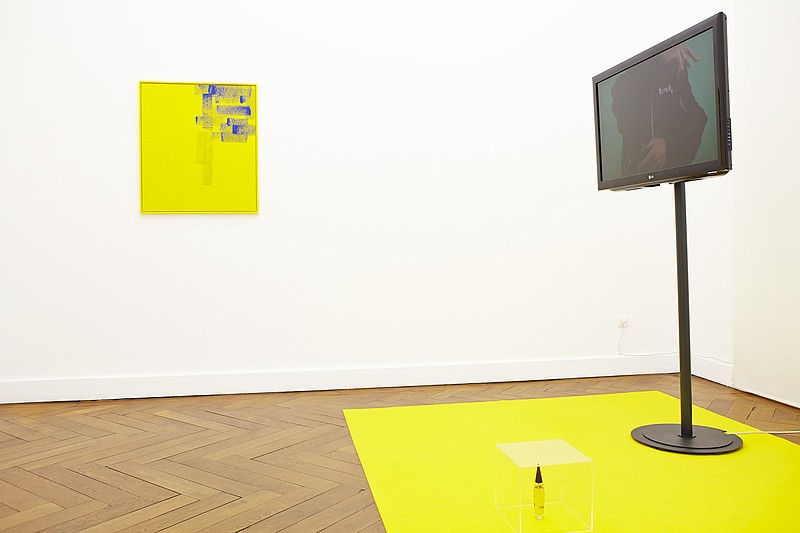"Whatever man built could be taken apart": Image / Order
05 Sep - 18 Oct 2015
"WHATEVER MAN BUILT COULD BE TAKEN APART": IMAGE / ORDER
05 September - 18 October 2015
Song-Ming Ang / James Gregory Atkinson & Helen Demisch / Juliette Bonneviot & Aude Pariset / Aleksandra Domanović / Claire Fontaine / Ella Goerner / Simon Hegenberg / Ilja Karilampi / Daniel Keller / Daniel Stempfer / Stephen Suckale
Nothing characterises our presence more than the growing technologisation and medialisation. In the two-part exhibition "Whatever you built could be taken apart": Image / Order two levels of the Kunstverein are dedicated to a specific aspect of this development featuring young artists who use the Internet and new technologies quite naturally as digital natives. The link between the two parts of the exhibition is the reconfiguration of existing source material from various contexts that characterise the methods of the artists. In the remodelling of the material - in the sense of contemporary appropriation methods - new perspectives, which illustrate societal influences, emerge.
Video has a key function in these critical reflections of our media influenced daily life, because the material often exists in the form of moving images. The exhibition considered the topic of Expanded Senses with regard to the medium video as an „Extension" of the human body, which is able to allow a different form of experience.
The increased fluctuation of images and their permanent availability in the digital age changed the perception and the use of images has undergone a radical change. On the second level of the Kunstverein, artistic practices are presented under the term Image, dealing mainly with strategies of appropriation of technically reproduced images. The artists in the exhibition quote, sample and transform mainly sources from the popular and mass culture. They isolate the images from the context of consumerist culture to make them visible and expose the structures which lead to their creation. Especially pop-music is useful for studies of this kind, being something like the disobedient child of the culture industry, which produces uncontrollable social links and sometimes mobilizes explosive social forces.
Under the title Order the influence of technological developments on social and political structures are outlined. Since industrialization, technological progress has significantly shaped the mass culture. So, a shift in many ways can be observed now by the media changes. In their #Accelerate! Manifesto for an accelerationist politics (2013) the two theorists Nick Srnicek and Alex Williams sketch out a group of problems that society is facing. In the foreground are ecology, changing work terms, the increasing automation of production processes, the no more functioning forms of State representation and the unaccountability of the financial markets. Young artists, who are more and more interested in these phenomena, are brought together in this exhibition. The exhibition cannot and does not supply clear solutions for this diversity but rather make them noticeable or tangible.
05 September - 18 October 2015
Song-Ming Ang / James Gregory Atkinson & Helen Demisch / Juliette Bonneviot & Aude Pariset / Aleksandra Domanović / Claire Fontaine / Ella Goerner / Simon Hegenberg / Ilja Karilampi / Daniel Keller / Daniel Stempfer / Stephen Suckale
Nothing characterises our presence more than the growing technologisation and medialisation. In the two-part exhibition "Whatever you built could be taken apart": Image / Order two levels of the Kunstverein are dedicated to a specific aspect of this development featuring young artists who use the Internet and new technologies quite naturally as digital natives. The link between the two parts of the exhibition is the reconfiguration of existing source material from various contexts that characterise the methods of the artists. In the remodelling of the material - in the sense of contemporary appropriation methods - new perspectives, which illustrate societal influences, emerge.
Video has a key function in these critical reflections of our media influenced daily life, because the material often exists in the form of moving images. The exhibition considered the topic of Expanded Senses with regard to the medium video as an „Extension" of the human body, which is able to allow a different form of experience.
The increased fluctuation of images and their permanent availability in the digital age changed the perception and the use of images has undergone a radical change. On the second level of the Kunstverein, artistic practices are presented under the term Image, dealing mainly with strategies of appropriation of technically reproduced images. The artists in the exhibition quote, sample and transform mainly sources from the popular and mass culture. They isolate the images from the context of consumerist culture to make them visible and expose the structures which lead to their creation. Especially pop-music is useful for studies of this kind, being something like the disobedient child of the culture industry, which produces uncontrollable social links and sometimes mobilizes explosive social forces.
Under the title Order the influence of technological developments on social and political structures are outlined. Since industrialization, technological progress has significantly shaped the mass culture. So, a shift in many ways can be observed now by the media changes. In their #Accelerate! Manifesto for an accelerationist politics (2013) the two theorists Nick Srnicek and Alex Williams sketch out a group of problems that society is facing. In the foreground are ecology, changing work terms, the increasing automation of production processes, the no more functioning forms of State representation and the unaccountability of the financial markets. Young artists, who are more and more interested in these phenomena, are brought together in this exhibition. The exhibition cannot and does not supply clear solutions for this diversity but rather make them noticeable or tangible.

